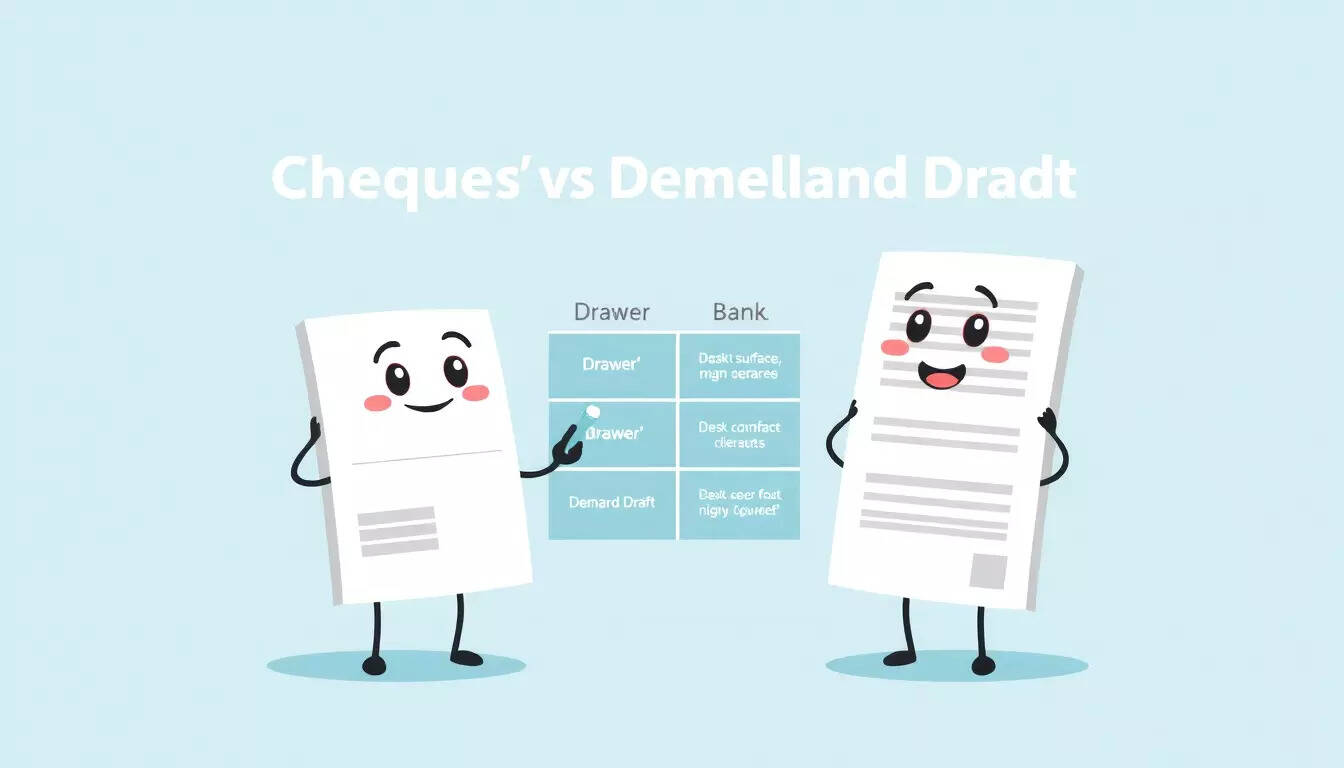Demand Drafts & Cheques Demystified: Everything You Need To Know
In the world of banking, cheques and demand drafts remain essential financial instruments for secure and reliable transactions. While cheques offer flexibility as a widely used payment tool, demand drafts provide enhanced security with guaranteed payments. Understanding the differences between these two instruments is crucial to leveraging their benefits effectively. This guide explores the fundamental distinctions, features, and types of cheques and demand drafts to help you make informed decisions for hassle-free financial transactions.
Understanding Cheques: Features and Types
A cheque is a widely recognised negotiable instrument used to transfer money securely between bank accounts. It serves as a written directive from the account holder, or drawer, instructing their bank to pay a specific sum to the designated recipient, known as the payee. Cheques are simple, convenient, and adaptable to various personal and business needs.
Key Features of Cheques
Demand drafts (DDs) are pre-paid financial instruments issued exclusively by banks. They guarantee secure payments and are widely accepted for transactions requiring high reliability. Unlike cheques, demand drafts are backed by funds collected in advance, eliminating the risk of non-payment.
Key Features of Demand Drafts
Understanding the differences between cheques and demand drafts helps determine their suitability for various transactions
Despite the rise of digital payment solutions like NEFT and RTGS, cheques and demand drafts retain their significance in certain scenarios. They provide a tangible record of transactions and are favoured for specific purposes, such as educational fee payments or high-value property transactions.
(This article is for informational purposes only. Readers are advised to consult their respective banks or financial advisors for specific advice tailored to their needs)

Understanding Cheques: Features and Types
A cheque is a widely recognised negotiable instrument used to transfer money securely between bank accounts. It serves as a written directive from the account holder, or drawer, instructing their bank to pay a specific sum to the designated recipient, known as the payee. Cheques are simple, convenient, and adaptable to various personal and business needs.
Key Features of Cheques
- Drawer and Payee: The cheque issuer is the drawer, while the recipient is the payee.
- Written and Numerical Amounts: Both are included to avoid discrepancies in payment instructions.
- Crossing: Drawing two parallel lines across the top corner restricts cash payments, ensuring funds are deposited into a bank account.
- Signature: A valid signature of the drawer authenticates the cheque, aligning with the bank's records.
- Bearer Cheque: Payable to the individual presenting it without requiring endorsement.
- Order Cheque: Issued to a specific person or organisation and requires endorsement.
- Crossed Cheque: Designed for deposit into bank accounts, not direct encashment.
- Post-Dated Cheque: Can only be cashed on or after a specified future date.
- Stale Cheque: Invalid if presented after six months of issuance.
- Self Cheque: Issued to oneself for personal account withdrawals.
Demand drafts (DDs) are pre-paid financial instruments issued exclusively by banks. They guarantee secure payments and are widely accepted for transactions requiring high reliability. Unlike cheques, demand drafts are backed by funds collected in advance, eliminating the risk of non-payment.
You may also like
- Poonch police announce Rs 5 lakh reward for info on terrorists' activities
- Nagaland govt names Air India Express as official travel partner of famed Hornbill Festival
- Delhi car blast case: NIA arrests detained Kashmiri college student, suspect's father dies of burns in immolation bid
- Afghanistan expands ties with neighbour Tajikistan
- Telangana Cabinet clears Bill for welfare of Gig workers
Key Features of Demand Drafts
- Prepayment Guarantee: The bank ensures funds are available before issuing the draft.
- Payee Specification: Demand drafts are payable only to the named recipient, enhancing security.
- Crossed Instrument: Like crossed cheques, demand drafts must be deposited into bank accounts, not cashed over the counter.
- Global Use: Often used in international trade for secure cross-border payments.
- Sight Demand Draft: Ideal for immediate payment requirements, especially in international trade. The vendor retains ownership of goods until payment is confirmed.
- Time Demand Draft: Used for scheduled payments, ensuring the recipient can claim funds only after a set period.
Understanding the differences between cheques and demand drafts helps determine their suitability for various transactions
- Payment Process: Cheques are drawn on individual accounts, while demand drafts are pre-paid by banks.
- Payment Guarantee: Demand drafts offer guaranteed payments, while cheques may bounce if funds are insufficient.
- Parties Involved: Cheques involve three parties (drawer, drawee, and payee), whereas demand drafts involve only the issuing bank and the payee.
- Cancellation: Cheques can be stopped by the drawer; demand drafts cannot.
Despite the rise of digital payment solutions like NEFT and RTGS, cheques and demand drafts retain their significance in certain scenarios. They provide a tangible record of transactions and are favoured for specific purposes, such as educational fee payments or high-value property transactions.
(This article is for informational purposes only. Readers are advised to consult their respective banks or financial advisors for specific advice tailored to their needs)









